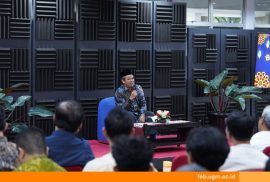On Thursday (5/10) Master of Accounting Faculty of Economics and Business Universitas Gadjah Mada (Maksi FEB UGM) held a public lecture entitled “Investigative Examination in the Context of Calculating State Losses in Cases of Alleged Corruption Crimes”. This public lecture presented Merlyn Dora Agustina Tambunan, SH., M.Com., CFE., CLA., CSFA as resource persons. The event started with an opening by Dian Kartika Rahajeng, S.E., M.Sc., Ph.D. as coordinator of the Forensic Auditing Master of Accounting course FEB UGM.
At the beginning of the lecture presentation session, Merlyn divided the lecture into four sub-sections, namely investigative examination, investigative examination in the context of calculating state losses, examination evidence, and methodology for calculating state losses. Merlyn explained that according to Article 13 of Law Number 15 of 2004, auditors can carry out investigative examinations with the aim of revealing indications of state/regional losses and/or state losses. In examining criminal elements, an investigative examination is carried out. Meanwhile, in order to assess State Losses, PI is carried out in the context of calculating state losses. Merlyn then explained the stages of the investigative examination which included pre-planning, followed by planning, implementation, and finally the reporting stage. At the pre-planning stage, the initial information is verified and analyzed and then concluded into a report on the results of the initial information review (LHPIA). Then at the planning stage, BPK develops hypotheses and prepares an examination program. Further at the implementation stage, evidence is collected and analyzed and evaluated, resulting in a final report on the implementation of the examination (LAPP). Then, at the reporting stage, the draft inspection report (LHP) is drafted and the LHP concept is finalized.
Merlyn continued her lecture by explaining about the Provision of Expert Information (PKA) based on Article 11 paragraph (1) of Law Number 15 of 2006 concerning BPK. PKA stages include preparation, implementation, and reporting. At the preparation stage, a PKA assignment letter will be formed. Then, at the implementation stage, the expert who gets the assignment will prepare material in the form of an Expert Chapter that will be used in the trial in court. Finally, at the reporting stage, the Expert compiles a PKA Implementation Report which contains information regarding the time, place, implementation, and information provided in the implementation of the PKA. Merlyn started a further explanation of the examination evidence by introducing 3 Fraud Axioms: (1) Fraud is hidden (2) Reverse Proof (3) Existence of Fraud. Merlyn also presented several definitions of evidence according to Arens & Loebbecke, Lawrence B. Sawyer, and the Fraud Examiners Manual. In applying the Audit Conceptual Framework, Merlyn explained that this, starting from inspection, observation, inquiries, and other general techniques have been listed and regulated in the State Auditing Standards. Merlyn also explained three types of examination evidence, namely physical evidence, documentary evidence, analytical evidence, and evidence. It also provides an explanation of the differences and the use of audit evidence and legal evidence. Merlyn also explained in full the legal evidence according to the Criminal Procedure Code, Expansion of Evidence in Corruption, and the classification of evidence. Merlyn also explained the approach to proving fraud.
Merlyn continued with the methods and details for calculating state losses, namely: the use of appraiser, opportunity cost, and interest as elements of state losses. Merlyn explained using definitions and case studies. The aspects that Merlyn explained also include Calculation of Total Loss, Total Loss with Adjustments, Net Loss, Real Value, Fair Price, Cost of Goods. Merlyn ended the Public Lecture with a question session.
Reportage: Hayfaza Nayottama




